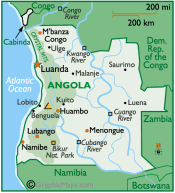-
-

Please Wait...
-
.ao Angolan Domain Country Information - .ao Angola Country Information
.ao

Price and Requirements for .ao Domains
![]()

.ao Angola Country Information
Angola, officially the Republic of Angola, is a country in south-central Africa bordering Namibia to the south, Democratic Republic of the Congo to the north, and Zambia to the east, and with a west coast along the Atlantic Ocean. The exclave province Cabinda has a border with the Republic of the Congo and the Democratic Republic of the Congo. Angola is a former Portuguese colony and has considerable natural resources, most notably petroleum and diamonds. At 481,321 square miles (1,246,700 km²), Angola is the world's twenty-third largest country (after Niger). It is comparable in size to Mali and is nearly twice the size of the US state of Texas, or five times the area of the United Kingdom.
Angola is bordered by Namibia to the south, Zambia to the east, the Democratic Republic of the Congo to the north-east, and the South Atlantic Ocean to the west. The exclave of Cabinda also borders the Republic of the Congo to the north. Angola's capital, Luanda, lies on the Atlantic coast in the north-west of the country. Angola's average temperature on the coast is 60 degrees Fahrenheit (16 °C) in the winter and 70 degrees Fahrenheit (21 °C) in the summer.
Angola has a rich subsoil heritage, from diamonds, oil, gold, copper, as well as a rich wildlife (dramatically impoverished during the civil war), forest, and fossils. Since independence, oil and diamonds have been the most important economic resource. Smallholder and plantation agriculture have dramatically dropped because of the Angolan Civil War, but have begun to recover after 2002. The transformation industry that had come into existence in the late colonial period collapsed at independence, because of the exodus of most of the ethnic Portuguese population, but has begun to reemerge (with updated technologies), partly because of the influx of new Portuguese entrepreneurs. Similar developments can be verified in the service sector.
Angola's population is estimated to be 18,498,000 (2009).[1] It is composed of Ovimbundu (language Umbundu) 37%, Ambundu (language Kimbundu) 25%, Bakongo 13%, and 32% other ethnic groups (including the Ovambo, the Ganguela and the Xindonga) as well as about 2% mestiços (mixed European and African) and 1% European . The Ambundu and Ovimbundu nations combined form a majority of the population, at 62%. The population is forecast to grow to over 47 million people to 2060, nearly tripling the estimated 16 to 18 million in 2011 [44] The last official census was taken in 1970, and showed the total population as being 5.6 million, but this is of course of historical interest only. The first post-independence census is to be held in 2012 or 2013.
The languages in Angola are those originally spoken by the different ethnic groups plus Portuguese due to its being a former Portuguese colony. The indigenous languages with the largest usage are Umbundu, Kimbundu, and Kikongo, in that order. Portuguese is the official language of the country. However, in Angola the mastery of the official language is probably more extended than elsewhere in Africa, and this certainly applies to its use in everyday life. Moreover, and above all, the proportion of native (or near native) speakers of the language of the former colonizer, turned official after independence, is no doubt considerably higher than in any other African country.
.ao Angola Domain Name - Country Information
| Country Domain | Angola Domain Name .ao |
|---|---|
| Country Information | Angola Domain Country Information .ao |
| TLD Bulk & Advanced Search | Angola Bulk Domain Registration .ao |
| WhoIs Server | .ao Whois Server Information |
| Domain Renewals | Renewal Angolan Domain .ao |
| Domain Transfer | Transfer Domain .ao |
| Domain Hosting | .ao Angola Web Hosting |
| SSL Certificates | SSL Certificates |
| Email Services | .ao Angola Email Services |
| Domain FAQ | .ao Domain Registration FAQ |
Angola Country Information Search Terms
Angolan Domain Country Information Angolan Domain Registrar Angolan World Wide Domain Registration Angolan Country Code Top Level Domain .ao Domain Information Angolan Country Information Angola Country Information












